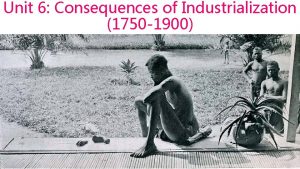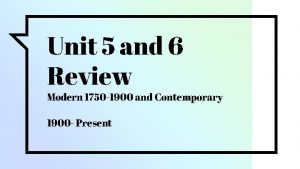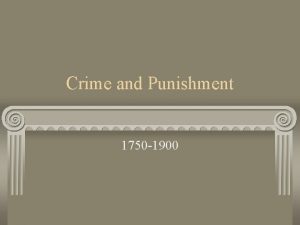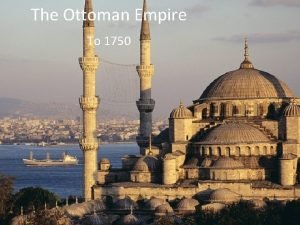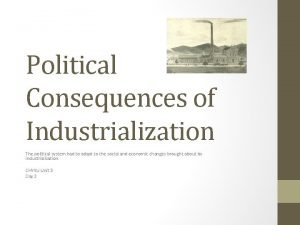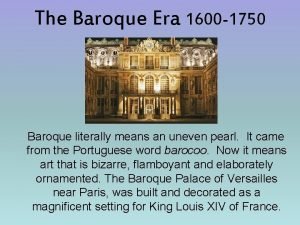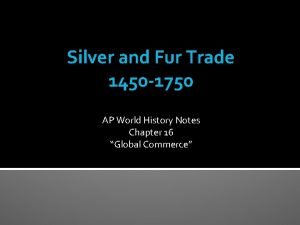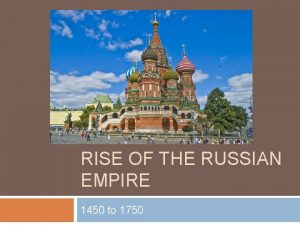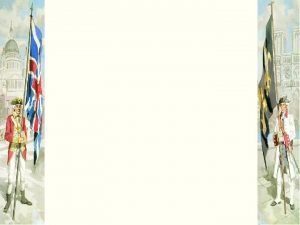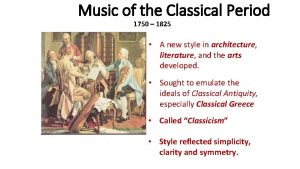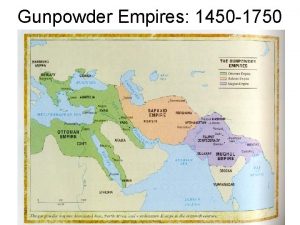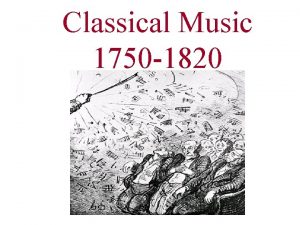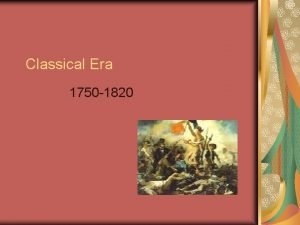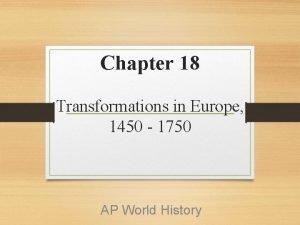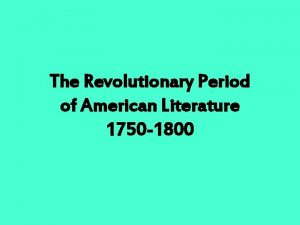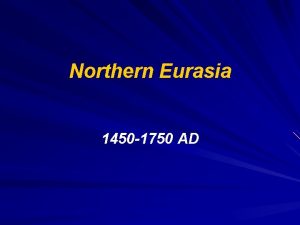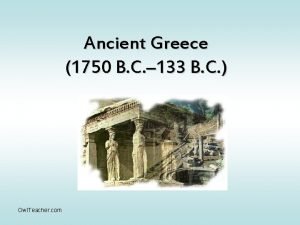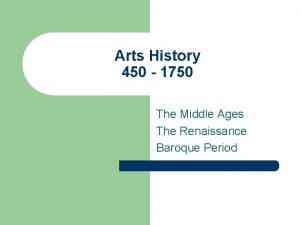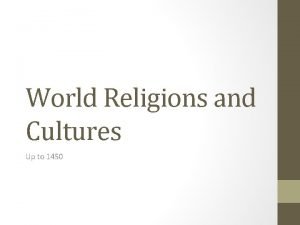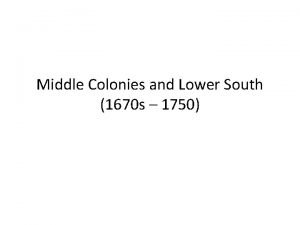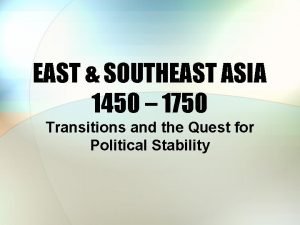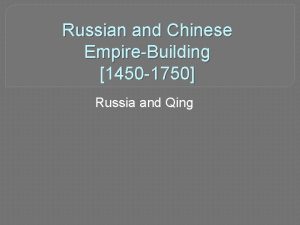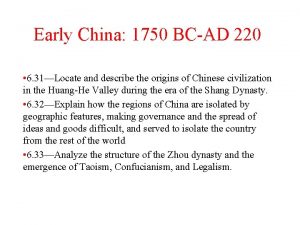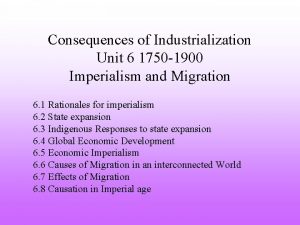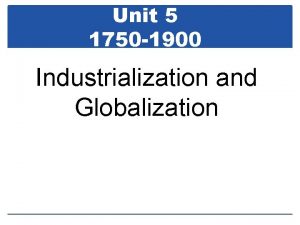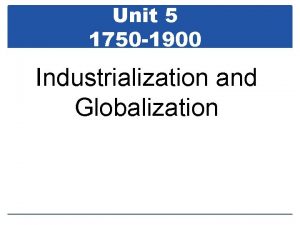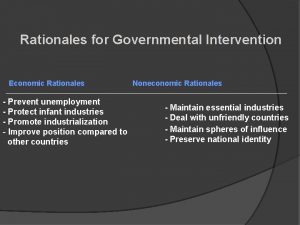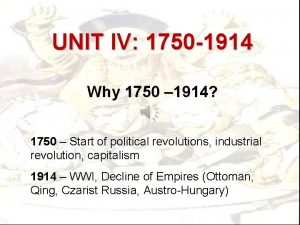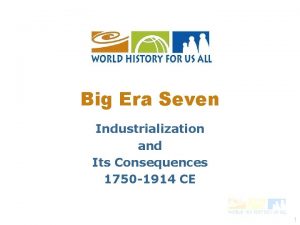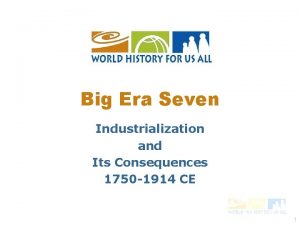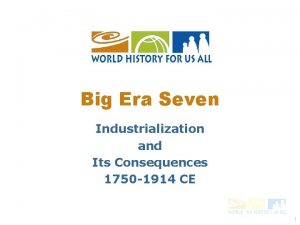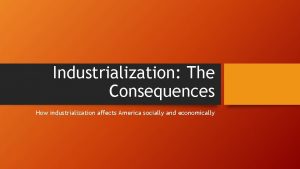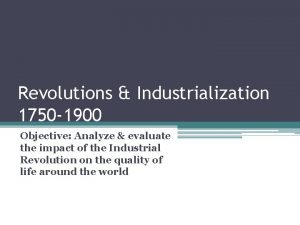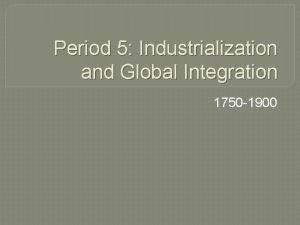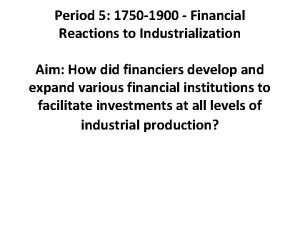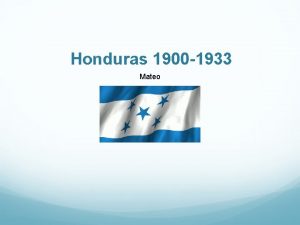Unit 6 Consequences of Industrialization 1750 1900 Rationales














































- Slides: 46

Unit 6: Consequences of Industrialization (1750 -1900)

Rationales for Imperialism

Rationales for Imperialism • Late 19 th – 20 th c. • Def: Domination of European powers – later USA & Japan – over subject lands in the larger world. This was the 1 st wave of imperialism (1450 -1750). PRE-INDUSTRIAL REVOLUTION & INDEPENDENCE MOVEMENTS

Rationales for Imperialism Rationales: Rudyard Kipling • Economic – need for raw materials & markets to sell manufactured items • Political – diffuse tensions at home (socialist challenge to the I. R. ) • Social – Civilizing missions • Religious – convert indigenous populations


Rationales for Imperialism Social Darwinism – racial and ethnic differences were the result of biology; white race was the most evolved (based on faulty science).

Rationales for Imperialism Technologies of Imperialism • Quinine: used to treat malaria • Steamships: project power farther inland • Suez Canal: 1859 -1869 (FR/BR) • Panama Canal: 1904 -1914 (USA) • Railroads: consolidated empires Telegraph: exchange messages

Rationales for Imperialism Opening of the Suez Canal and the modern Suez Canal Resource Exported From: Why? Cotton Egypt Textiles Rubber Amazon & Congo basin Tires, shoes, hoses, etc. Palm oil SS Africa Lubricate industrial machines Guano Peru & Chile Fertilizer Meat Uruguay & Argentina Food Diamonds Africa Luxury

The British Empire State Expansion (1750 -1900)

State Expansion – British (India) • By 1700, Mughal power weakened. • British East India Company was making huge profits from opium, cotton, tea, and coffee exports. • Indian troops called sepoys enforced company rule.

State Expansion – British (India) SEPOY REBELLION (1857) • CAUSE: Cultural conflict; friction between sepoys and British • CONFLICT: Bullets for rifles were in cartridges protected by paper waxed with animal fat; had to tear it with teeth. Those who refused to use cartridges were convicted of mutiny. • EFFECT: Turned into a war for independence; British victory by 1858; direct imperial control was imposed on India.


Indian currency with Queen Victoria on it State Expansion – British (India) Global economic trends! • India produced raw materials/food (export economy) • India was forced to purchase British finished goods (Indian textile industry destroyed).

State Expansion – British (India) Impact of British Rule? • British emphasis on cash-crop farming (cotton) led to food shortages & famine • Class system with British at the top • Railroads, sewer systems built (reduced cholera deaths) • Rise of nationalism Ram Mohan Roy called for social reforms in colonial India

State Expansion – British (China) • Indian-grown opium was being sold to China, addicting millions. • British sold it for silver which was used to buy Chinese products (tea).

State Expansion – British (China) The Treaty of Nanjing (right) ended the Opium Wars (left) • Efforts to stop the trade ignited war. • Opium War (1839 -42) = Chinese defeat. • Result: Unequal treaties (Treaty of Nanjing) which curtailed Chinese sovereignty • France, Germany, USA, Japan all signed unequal treaties • By 1900, 90 ports were controlled by foreign powers

State Expansion – British (China) • Taiping Rebellion: led by Hong Xiuquan against the Qing; 20 -30 million deaths. • Self-Strengthening Movement: China's program of internal reform 1860 s-1870 s; based on the application of Confucian principles & limited borrowing from the West. • Boxer Rebellion: Anti-imperialist, anti-foreign rebellion; many were Christians; failed undermined Qing legitimacy. Qing collapsed in 1911

Remember the Meiji Restoration!

State Expansion – British (SE Asia) • Singapore – trade center in the Strait of Melaka • British conquered Malaysia 1870 s 1880 s (rubber export) British controlled sea lanes from S. China Sea to Indian Ocean

State Expansion – British (AUS/NZ) SETTLER COLONIES • First permanent British settlers were convicts sent into exile in 1788. • Gold rush in 1851 brought many free settlers. • Many Chinese arrived, too.

State Expansion – British (AUS/NZ) BRITISH AUSTRALIA • Aborigines suffered due to disease; others displaced to take land for hunting/herding BRITISH NEW ZEALAND • Maori suffered due to disease • Voluntary migration of British (whaling, timber) • Maori battled the British but were similarly displaced

State Expansion – British (L. America) • Imperialism was not just in Asia, the British constructed to port of Buenos Aires, Argentina. • INDUSTRIALIZED STATES HAD DISTINCT ECONOMIC ADVANTAGE!

“The Sun Never Sets on the British Empire”

State Expansion – French (SE Asia) • French built Indochina (Vietnam, Cambodia, Laos); also territory in West Africa • Siam (Thailand) remained independent as a buffer between British and French

State Expansion – Dutch (SE Asia) Shift from the Dutch East India Company (VOC) TO Dutch government control in Indonesia.

State Expansion USA • Trail of Tears: Forced migration of N. Americans from their homeland in GA into OK (under Andrew Jackson) In the name of Manifest Destiny

State Expansion - Africa

State Expansion - Africa Berlin Conference (1884 -1885) • “Effective occupation” of Africa (military conquest or signed agreement). • No African leaders invited, no regard for language, religious, tribal associations. • Public notice that Africa would be carved into colonies.

State Expansion - Africa Congo Free State Belgian Congo • King Leopold II organized it in 1878 as a private commercial company to exploit rubber resources. • Known for terrible working conditions, forced labor (4 -8 million dead). • Eventually taken over by the Belgian government.

State Expansion - Africa South Africa • Boers (Afrikaners): Dutch settlers in S. Africa • British sought to extend control in this area & conflict with Afrikaners ensured. British arrive in S. Africa 1820

State Expansion - Africa South Africa: THE BOER WARS • Afrikaners undertook the Great Trek eastward to move away from British rule. • Afrikaners overcame local resistance and set up Republic of Natal, Orange Free State, and the Transvaal (mid 1800 s). • British discovered diamonds & gold! WAR breaks out. • Concentration camps were used to racially separate prisoners • Result? Afrikaners lost by 1902 and the British consolidated the Union of S. Africa; white society came to dominate black Africans.

Human Toll of Imperialism

Human Toll of Imperialism

Human Toll of Imperialism

Imperialism Themes • Non-state to state colonial control (Congo, Indonesia) • European states expand in Africa (British, French) • Settler colonies (Australia & NZ) • Industrialized states practiced economic imperialism over non-industrialized states (China, Argentina) • Portugal and Spain lost ground (Indian Ocean, SE Asia) • USA, Japan gained ground

Migration MIGRATION TRENDS • Population increased globally (food/medicine post-IR) • New modes of transportation • Most migrants relocated to cities (urbanization) • USA received the majority of the migrants • Some freely relocated • Indentured servitude & convict labor continued

Migration IRISH TO USA • Push: Potato Famine (1845 -1850) • Pull: Economic opportunity • Anti-Catholic prejudice was strong (NYC, Chicago, San Fran. ) • Took low-wage jobs such as laying rail lines

Migration CHINESE TO USA • Push: Economic chaos in China • Pull: Economic opportunity, CA Gold Rush • Manual laborers (agricultural, Trans-Continental RR) • Anti-Chinese sentiment was strong, only group ever to be excluded

Migration Effects of Migration: 1. Creation of urban ethnic enclaves (Chinatown)

Angel Island Immigration Station Migratio n Effects of Migration: 2. Women took on new roles in the home society as most migrants were male.

Migration Effects of Migration: 3. Exclusionary Policies • Chinese Exclusion Act (1882) – Stopped Chinese immigration; prevented citizenship; lasted until 1940 s. • White Australia Policy (1901 -1973) – Immigration restricted to Europeans

Societies at Crossroads

The Ottoman Empire

The Ottoman Empire • Slow decline since the 17 th c territory losses, janissary power increased, foreign manufactured goods flooded in • Tanzimat Reforms – 1830 -1870 educational, political, legal reforms intended to modernize the empire and stop decline. Secular schooling Equality before the law, Muslim or not

The Ottoman Empire • Young, educated citizens & religious conservatives hated the reforms (undermined Islamic foundations) • Abdul Hamid’s despotic rule generated liberal opposition groups • Young Turks – Seized power in a 1908 coup. • Wanted universal suffrage, religious freedom, emancipation for women • During their rule, sultans reigned but did not rule • Empire survived because European diplomats couldn’t agree on how to dispose the empire without upsetting the balance of power (“Eastern Question”). Young Turks Flyer – “Long live the fatherland…

The Russia n Empire • Alexander II abolished serfdom as a way to encourage industrialization. • Trans-Siberian Railway (steel, coal, petroleum attracted Europeans) • Nicholas II took power in 1894 • Bloody Sunday – protesters in 1905 stormed St. Petersburg demanding representative government • Duma was established • Romanov dynasty was in trouble!
 Convict food
Convict food Jennifer michener
Jennifer michener 1750-1900 portfolio map
1750-1900 portfolio map Crime and punishment 1750 to 1900
Crime and punishment 1750 to 1900 1750 ottoman empire
1750 ottoman empire Consequences of industrialization
Consequences of industrialization Unit 10, unit 10 review tests, unit 10 general test
Unit 10, unit 10 review tests, unit 10 general test Mughal empire 1450 to 1750
Mughal empire 1450 to 1750 What period lasted from 1750-1825?
What period lasted from 1750-1825? It is an era from 1750-1820
It is an era from 1750-1820 For men
For men Silver trade 1450 to 1750
Silver trade 1450 to 1750 Russia 1450
Russia 1450 North america map 1750
North america map 1750 Neoclassical 1750 to 1850
Neoclassical 1750 to 1850 The classical period started from 1750 to 1872
The classical period started from 1750 to 1872 Jonathan sebastian bach
Jonathan sebastian bach 1685 1750
1685 1750 Land based empires 1450 to 1750
Land based empires 1450 to 1750 Music of the classical period (1750 to 1820)
Music of the classical period (1750 to 1820) 1820-1750
1820-1750 It is an era from 1750-1820
It is an era from 1750-1820 Europe map 1750
Europe map 1750 Unity of mood in baroque music
Unity of mood in baroque music American literature 1750 to 1800
American literature 1750 to 1800 Japan 1450-1750
Japan 1450-1750 What does baroque mean
What does baroque mean Puhelaulunomaisia
Puhelaulunomaisia 1750-1825
1750-1825 Koloniale uitbreiding na 1750
Koloniale uitbreiding na 1750 La traviata juomalaulu
La traviata juomalaulu Kompositör född 1756
Kompositör född 1756 Ancient greece 1750 b.c-133 b.c answers
Ancient greece 1750 b.c-133 b.c answers 1750-600
1750-600 Colegio interparroquial del sur santo cura de ars
Colegio interparroquial del sur santo cura de ars El barroco definicion
El barroco definicion 1750-1600
1750-1600 Middle ages nobles
Middle ages nobles Religion in 1450 to 1750
Religion in 1450 to 1750 Marat artist
Marat artist Middle colonies
Middle colonies Heparinom indukovana trombocitopenija
Heparinom indukovana trombocitopenija Southeast asia 1450 to 1750
Southeast asia 1450 to 1750 Bach classical period
Bach classical period Splitski nadbiskup 1450
Splitski nadbiskup 1450 1750 bc ancient china
1750 bc ancient china 1820-1750
1820-1750
